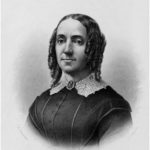“The First Jewish Feminist:” Ernestine Rose
By Jackie Brettschneider, Research Intern, Center for Jewish History
Ernestine Rose is popularly known as the first Jewish feminist. It didn’t take her long to realize that women weren’t treated the same way as men. Her views were extremely progressive even from a young age, and she stated that, “I was a rebel at the age of five.”. She believed in women’s rights, religious freedom, and abolition, she would later give many speeches on these issues when she became a popular orator.
Rose was born in a Shtetl in Poland on January 13, 1810. She was the only daughter to her father. Her father was a rabbi, which allowed Rose to get an unusually thorough education for a girl at the time.
At the age of just 14, young Rose rejected the idea that women are inferior to men and any Jewish beliefs that supported that thought. Almost 200 years ago, this young girl rejected an idea that is still sometimes present in the thoughts of people and the religions of today. She rebelled against the Jewish prayer said daily by men, “I thank thee Lord that thou hast not created me a woman.” She also refused to say the woman’s prayer, “I thank thee Lord that thou hast created me according to thy will.” These prayers, according to Rose, are sexist because of the implication that men are superior to women.
Rose’s mother had sadly passed when Rose was only 15. Her father, two years after the passing of her mother, had chosen the man who Rose was supposed to marry. Rose, however, refused to marry the man that he had chosen. She brought her case before the civil court, something that was very unusual for a woman to do at the time. Her belief in equality, formed at the young age of 14, affected the way she lived her life. She didn’t allow others to treat her poorly because she was a woman. She ended up winning the case and collecting the insurance that her mother had left to her suitor. She gave most the money back to her father so he could support himself, but took the rest in order to leave Poland.
She moved to England where she became an orator. She met Robert Dale Owen, a socialist, who believed in equality and human rights. Owen helped to fuel and inspire her future activism. Owen convinced Rose to speak at meetings of the Association of All Classes of All Nations, which was co-founded by Owen and Rose. During her time in England, she met her future husband the jeweler William Ella Rose, who also followed Owen and his beliefs.
Rose moved to the United States in 1836 and lived in New York. In the United States she became known as the “Queen of the Platform,” because of the many speeches she gave on religious freedom, women’s rights, and the abolition of slavery. She spoke at numerous local and national conventions on women’s rights. She toured with the well-known feminist and suffragette Susan B. Anthony. Anthony actually used Rose’s slogan “agitate, agitate” when speaking about fighting for women’s rights. Rose also worked with Elizabeth Cady Stanton in the fight for abolition and women’s rights. She believed in the emancipation of all oppressed people, including slaves and women. Although Rose was told to give up on women’s suffrage and focus on abolition, she continued her fight. Sadly, she never saw women gain the right to vote. Susan B. Anthony called Rose one of the pioneers for the cause of women’s suffrage.
Rose and her husband returned to England from 1850 to 1869 for unknown reasons. Rose would later pass in England on August 4, 1892.
Rose is considered one the first Jewish feminists because of her dedication and work in the fight for women’s rights at a time way before women even gained the right to vote. Rose noticed the mistreatment of women at a very early age, making her an incredibly unique individual. She isn’t well known and is often left out of history books; this could be because of anti-Semitism. It is important that she is remembered because she is definitely a huge inspiration to Jewish women and all women because of her dedication to the fight for the rights of all women.
For more on Ernestine Rose see:
The Jewish Women’s Archive at http://jwa.org/encyclopedia/article/rose-ernestine
Ernestine L. Rose Women’s Rights Pioneer By Yuri Suh
Photo from public domain, https://commons.wikimedia.org/wiki/File%3AErnestine_Rose_7.jpg / http://archive.org/details/historyofwomansu01stanuoft / History of woman suffrage;
by Stanton, Elizabeth Cady, Anthony, Susan B. (Susan Brownell), Published 1887

